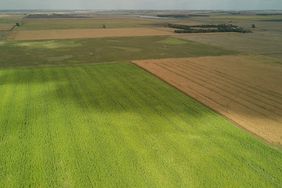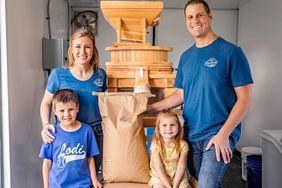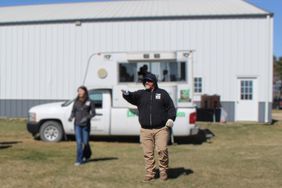:max_bytes(150000):strip_icc()/103095726-1-094708e264814b399749f9b8fdada444.jpg)
During last year's election, bashing trade agreements was as irresistible to presidential candidates as a pile of pork chops is to a pack of puppies.
Donald Trump, Hillary Clinton, and Senator Bernie Sanders (I-VT) all bashed the Trans Pacific Partnership (TPP) trade agreement during last year's presidential campaign. Once in office, President Trump killed the TPP and is now taking steps to renegotiate the North American Free Trade Agreement (NAFTA).
Earlier this year, farm group leaders and U.S. representatives and senators addressed the North American Agricultural Journalists meeting on trade matters.
"Farmers Union is in line with the Trump administration with TPP," says Zach Clark, government relations representative with the National Farmers Union.
Changes to NAFTA, though, make NFU nervous, says Clark, as does trade rhetoric by the Trump administration, in general. Disputes can escalate into a costly trade war between the U.S. and leading customers like China, Mexico, and Canada, he says.
Soybeans are a huge export crop for U.S. farmers, with $14.2 billion worth of soybeans being exported in 2016 to China.
Senator Pat Roberts (R-KS) says President Trump's U.S. Trade representative, Robert Lighthizer, has experience negotiating trade bills.
"He knows most trade bills are overcriticized and oversold," says Roberts. "There is a sweet spot there."
Roberts is apprehensive, though, about the Trump administration's lumber and dairy trade disputes with Canada.
"I think that's asking for trouble, as opposed to whatever accomplishment they might want to accomplish," says Roberts.
Canadian Trade Troubles
However, Representative Collin Peterson (DFL-MN) thinks the Trump administration has a point.
"This issue has evolved since I first came in the House (in 1991)," he says. "We had a softwood lumber agreement, and it got undone. It is not working. So, I support the softwood lumber (argument) in what they are talking about.
"I don't think they understand what is being done in dairy," he continues. "Some people are just waking up to NAFTA. We allowed the Canadians to keep their (dairy) supply-management system in NAFTA, and we allow them to export to us. That is what we agreed to."
He notes that Grassland Dairy Products, a Greenwood, Wisconsin, firm, found a loophole to enter the Canadian market selling ultra-filtered milk, a milk protein concentrate that works well for making cheese. This dodges tariffs that Canada applies to other U.S. dairy products. Impacted are 75 dairy farmers selling milk to Grassland Dairy who had their contracts cancelled earlier this year.
To be fair, both Senator Mitch McConnell (R-KY) and Speaker Paul Ryan say they didn't have the votes to pass TPP in 2016, says Ray Starling, special assistant to the president for agriculture, trade, and food assistance. "Thus, it's impossible to compare the current trade picture to a multilateral trade agreement that had no chance of becoming law.
47%
The amount of total U.S. agricultural exports that went to China, Canada, and Mexico in fiscal year 2016.
"We have to access new markets," Starling says. He adds that questions must be answered in trade deals about items such as disputes over biotechnology, intellectual property, and phytosanitary issues.
"We have to make sure they are based on scientific standards," he says.
TPP left a good foundation in place for bilateral trade agreement with countries in the TPP, says Mike Conaway (R-TX), who heads the House Agriculture Committee.








